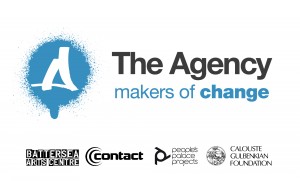Cycles of change – the methodology of The Agency
Post by Naomi Paxton
The idea for and methodology of The Agency was originally developed by Marcus Faustini in the favelas of Rio de Janeiro, Brazil in 2010. Wanting to ’empower young people to become agents of change’, to challenge stereotypes and encourage young people to change their own communities for the better, the tremendous success of the Agência project sparked international interest. In close collaboration with Faustini, two arts organisations who use participatory theatre to engage young people in economically precarious areas – Contact in Manchester and Battersea Arts Centre in London – now run The Agency in Moston, North Manchester, and Clapham, South London, respectively – employing artists and theatre practitioners to to deliver an arts based methodology that has an entrepreneurial, rather than theatrical outcome. The participants develop a business idea over the course of the process and the first cycle of the project ends with the pitching of their ideas to a panel. If successful, they are awarded money to realise their idea, and supported financially and practically throughout the second phase of the project to make it happen.
Initially, young people are invited to attend weekly sessions in a venue in their community – for the Moston participants it has been the Miners Arts and Music Community Centre. Each Saturday session begins with a physical warm up to focus the participants and then various key ideas are explored over the coming weeks – for example: a compass, with the four points being Desire, Territory, Form and Idea; an exercise in which the life experience of the participants so far are presented as a project, through a written timeline of past, present and future actions; and the use of mapping local communities as a tool to help participants become aware of existing and potential networks of support and interest. These themes build not only confidence and group dynamics but challenge young people to take their communities and aspirations seriously, to think pragmatically about the potential for their creative and business ideas.
The process is playful and accessible – in one session Monsters and Avatars are introduced as concepts through which participants can explore personality traits and coping strategies that can help them develop not only their ideas but also their presentation styles and future working relationships. The group are asked to design monsters with unique and specific qualities that are built to survive, and to think of themselves as Avatars with key strengths that contribute to a successful team – e.g. the Collaborator, the Optimist, the Trailblazer and the Practical.
By week 5, the focus begins to shift in a more formal direction to the potential business ideas the aspiring Agents will develop. As the second half of the first cycle continues, preparations for the final pitch begin – with sessions that include event planning, marketing and presentation practice through public consultation and feedback. The final session of the first cycle is the pitching session, where the young people present their ideas to the panel.
What’s clear throughout the session plans for the first cycle is the tremendous amount of care taken to encourage participants to think about their own lives, experiences and ideas as positive aspects of their present as well as their future. When I met the successful Agents at the beginning of the second cycle of the Agency in January 2015, I was struck by their confidence as individuals and as a group. The dynamic of the room was relaxed but focussed – and as their business ideas began to come to life, the support given to them by the Peer Mentors, Lead Artist and Project Manager was unstinting. You can read more about the Moston Agents here.
To see the documentation and interviews from those involved in The Agency in Moston in the 2014/2015 cycles – go to our mapping site and our youtube playlist.
(blog post by Naomi Paxton)


Comments are closed
Sorry, but you cannot leave a comment for this post.